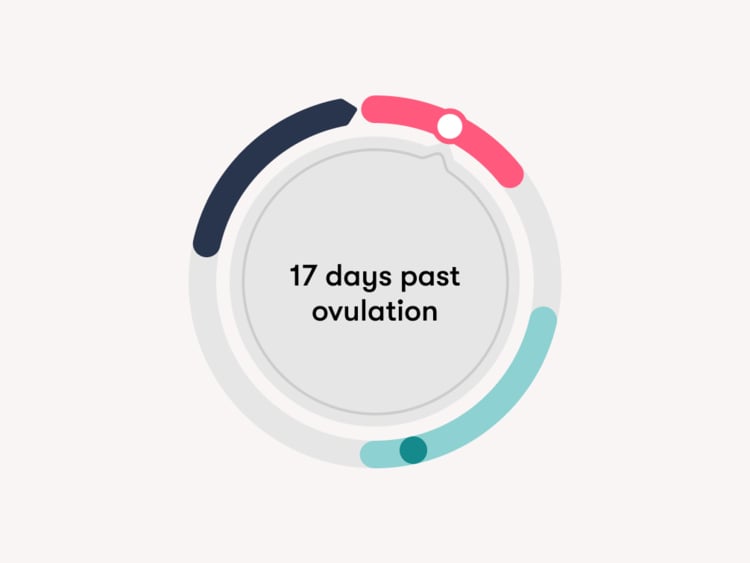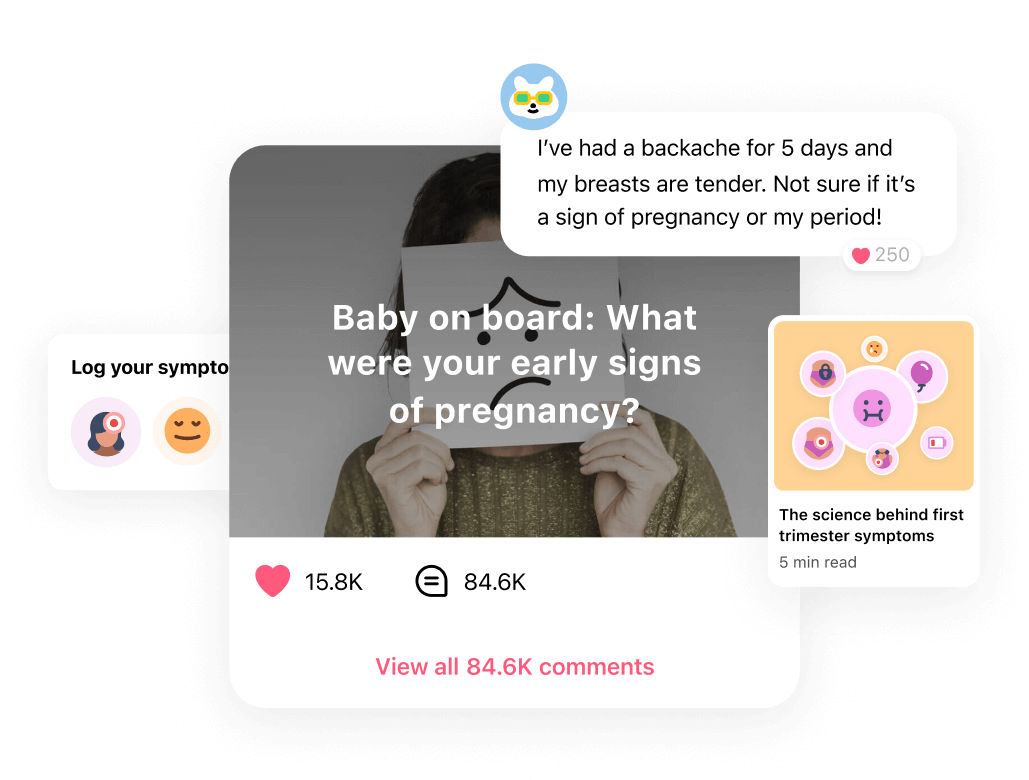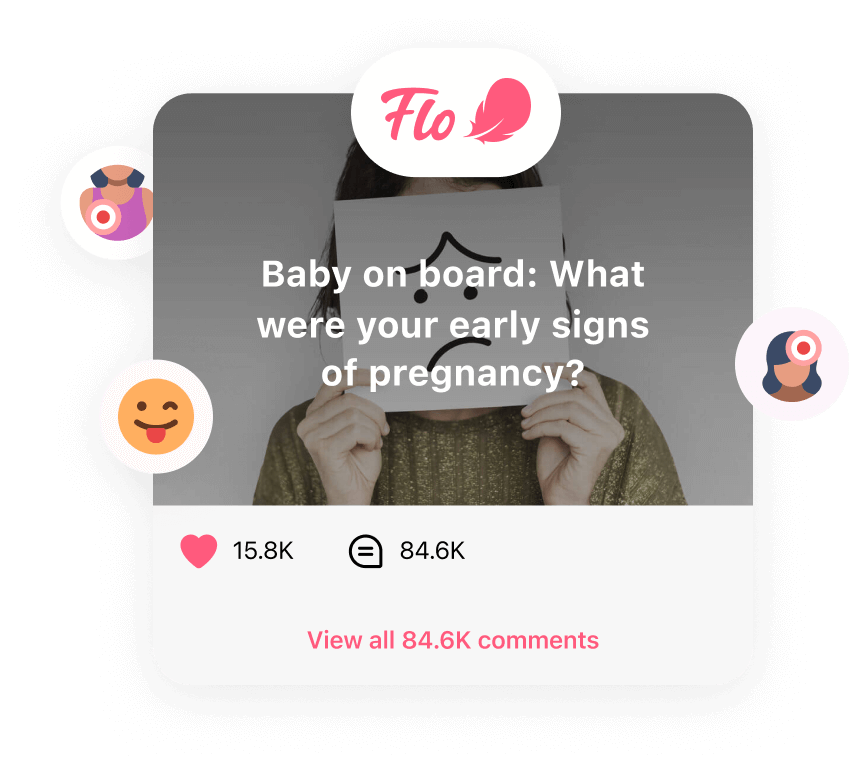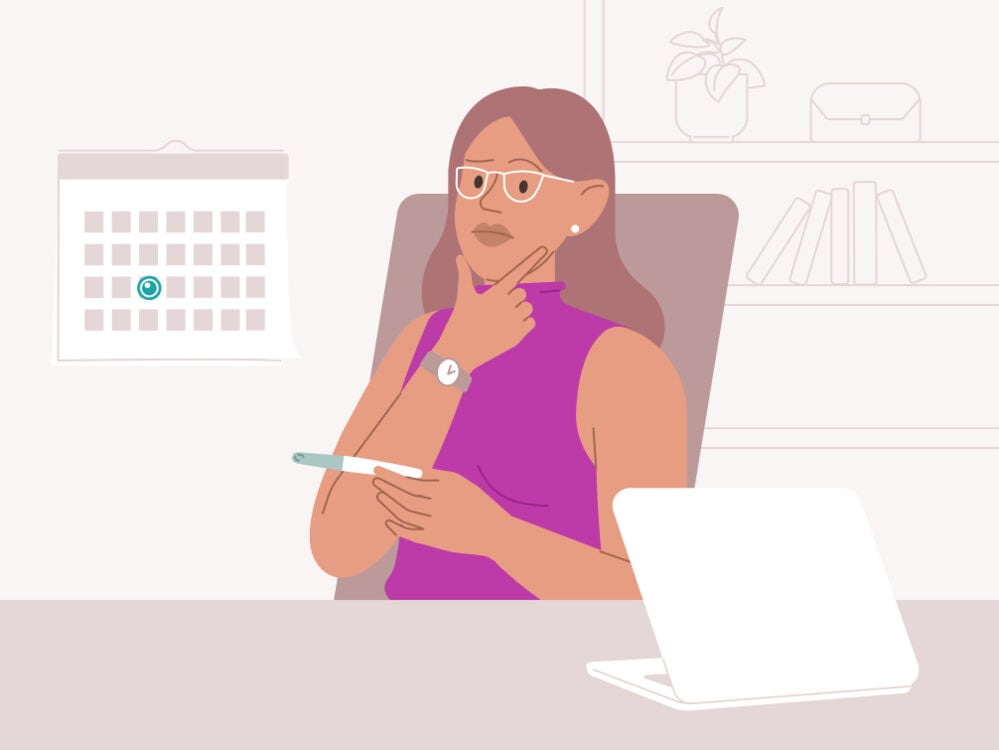From potential pregnancy symptoms to hormonal changes, here’s the lowdown on 17 DPO.
-
Tracking cycle
-
Getting pregnant
-
Pregnancy
-
Help Center
-
Flo for Partners
-
Anonymous Mode
-
Flo app reviews
-
Flo Premium New
-
Secret Chats New
-
Symptom Checker New
-
Your cycle
-
Health 360°
-
Getting pregnant
-
Pregnancy
-
Being a mom
-
LGBTQ+
-
Quizzes
-
Ovulation calculator
-
hCG calculator
-
Pregnancy test calculator
-
Menstrual cycle calculator
-
Period calculator
-
Implantation calculator
-
Pregnancy weeks to months calculator
-
Pregnancy due date calculator
-
IVF and FET due date calculator
-
Due date calculator by ultrasound
-
Medical Affairs
-
Science & Research
-
Pass It On Project New
-
Privacy Portal
-
Press Center
-
Flo Accuracy
-
Careers
-
Contact Us
17 DPO: Are there any pregnancy symptoms 17 days past ovulation?


Every piece of content at Flo Health adheres to the highest editorial standards for language, style, and medical accuracy. To learn what we do to deliver the best health and lifestyle insights to you, check out our content review principles.
Have you reached 17 days past ovulation (DPO) but aren’t sure if you’re pregnant and when you can do a test? When you’re trying to conceive, it’s normal to be on high alert for some of the common signs of early pregnancy. And this can be pretty all-consuming.
Many experts recommend waiting until the first day of a missed period before taking a pregnancy test. This can mean slightly different things for different people as the length of your cycle is totally personal to you. So here’s a closer look at what’s happening in your body at 17 DPO, including early signs of pregnancy and how to boost your chances of an accurate pregnancy test result.
Key takeaways
- You’re classed as being pregnant after a fertilized egg attaches to the lining of your uterus. This is called implantation. Generally, it happens between six and 10 DPO, which means by 17 DPO, you might have been pregnant for over a week.
- You may be curious if you can take a pregnancy test at 17 DPO if implantation has already happened. Many doctors recommend that you wait to take a pregnancy test until the first day of your missed period.
- Waiting to take a test ensures that your levels of the pregnancy hormone human chorionic gonadotropin (hCG) are high enough to be picked up in your urine.
- You may not have noticed any of the common signs or symptoms of early pregnancy at 17 DPO, but fear not; this is normal. If you are pregnant, then it’s still early days.

 Over
7.8M
ratings averaging
4.8/5
*
Over
7.8M
ratings averaging
4.8/5
*
Understand your body’s signals with the Flo app
- Chat with others who are trying to get pregnant.
- Get trusted information on signs of pregnancy from 100+ medical experts.
- Log your symptoms and learn what they could be trying to tell you.
 Over
7.8M
ratings averaging
4.8/5
*
Over
7.8M
ratings averaging
4.8/5
*

Trying to conceive?
The Flo app can help you through the two-week wait.

 Over
7.8M
ratings averaging
4.8/5
*
Over
7.8M
ratings averaging
4.8/5
*
Understand your body’s signals with the Flo app
- Chat with others who are trying to get pregnant.
- Get trusted information on signs of pregnancy from 100+ medical experts.
- Log your symptoms and learn what they could be trying to tell you.
17 DPO: What to expect?
Seventeen DPO means that 17 days ago, one of your ovaries released an egg to be potentially fertilized by a sperm. It can be hard to picture where you are in your cycle at 17 DPO and why this might be an important time for you. Think of your cycle in two parts or phases:
- The follicular phase: Your follicular phase starts on the first day of a new period and runs through to the midpoint in your cycle when one of your ovaries releases an egg to potentially be fertilized. This is known as ovulation. If you have a 28-day cycle, then your follicular phase will last around 14 days. At this point, your estrogen levels rise, and the lining of your uterus thickens in preparation for a potential pregnancy.
- The luteal phase: The second part of your cycle is known as your luteal phase. It starts after the day that you ovulate and runs to the end of your cycle (aka the day before a new period begins). If you’re pregnant, then your progesterone levels may rise and continue to do so. However, if you haven’t conceived in this cycle, then your progesterone levels may drop again before the start of your period.
If you are pregnant at 17 DPO, then your body may have produced a whole new organ — your placenta. Pretty amazing, right? Your placenta supports your developing fetus and releases the pregnancy hormone hCG. This is the hormone that at-home pregnancy tests pick up in your pee. While it starts low, your hCG levels rise rapidly as your pregnancy progresses.
“HCG is detectable in the blood about six to 11 days after conception, but it takes slightly longer to appear on at-home pregnancy tests that measure hCG in urine,” says Dr. Nazaneen Homaifar, obstetrician and gynecologist, Inova Health System, Washington, DC, US. “Rising hCG levels are also responsible for some of the early pregnancy symptoms.”
If this is the case, then you might be curious if 17 DPO is the right time for you to take a test.
Can I take a pregnancy test at 17 DPO, or is it too early?
Figuring out when you can take a pregnancy test can feel a little bit like a numbers game. Many experts recommend that you wait until the first day of your missed period before reaching for a test. Generally speaking, 14 DPO might be the earliest you can take a test. However, if your cycle is irregular, then you might still be waiting for the day of your missed period, so 17 DPO could still be too early.
Waiting to take a test can feel impossible, but it’s crucial to give your body enough time to produce enough hCG. As your hCG levels rise rapidly at the start of pregnancy, the longer you wait to take a test, the easier it is to detect higher levels of hCG in your pee. So, try to hang in there. If 17 DPO is still too early for you, then it won’t be long until you can take a test.
How to take a pregnancy test
If you’ve missed your period at 17 DPO, now may be the time to take a test. This can feel like a big day, and if you’re feeling nervous, don’t worry. This is very normal. Try to remember that if you use a pregnancy test at the right time and exactly as instructed, many are 99% accurate. So, here are some things to think about ahead of taking a test:
- Before you take a test, think about where you’d like to take it. You might have some mixed feelings about taking a pregnancy test, so think about where you feel most comfortable. It might be at home by yourself or with your partner or friend. It could be at a family member’s or friend’s house. Go with whatever feels right for you.
- Read through the instructions a couple of times so you know what to do. Peeing on a stick might sound like a simple task, but it’s important that you feel in control and know what you’re doing before you take a test. There’s no rush, after all.
- Pregnancy tests do expire. It might not feel obvious, but check the date on your test packet. If your pregnancy test has passed its expiration date, this can impact the results.
- Do you know what negative and positive results look like? There are different ways that a positive result can be shown depending on the brand you pick. It may look like a plus sign, a line, or the word “pregnant,” so it can be helpful to know what to expect.
- You might wonder when the optimal time to take a test is in the day. Dr. Homaifar recommends the morning as being your prime time. She explains that this is because “Your urine is the most concentrated, making hCG easier to detect.” You also don’t need to drink lots of fluids beforehand. This can dilute your hCG levels.

Understanding your pregnancy test results
If you’ve been trying to conceive, finding out you’re pregnant can be really exciting. After getting a positive test result at 17 DPO, the best next thing to do is reach out to your health care provider. You may have lots of questions at this point, so this is the time to ask. Plus, your health care provider will be able to book your first prenatal appointment.
Sometimes, there’s only a faint line in the results window, so you might be struggling to determine whether you’re pregnant or not. Try not to worry; this may just mean that you’re very early on in your pregnancy or your pee was diluted. If you’re at all confused or worried, test again in a week or speak to your health care provider.
When you’ve been waiting to take a pregnancy test, getting a negative result can be disheartening, but try not to lose hope. If your period hasn’t arrived at 17 DPO, there is a possibility that it could be a false-negative result. This is when a pregnancy test indicates that you aren’t pregnant, but you actually are. It can happen when your hCG levels aren’t high enough to show up yet.
“Depending on how long your menstrual cycle is, or if you have irregular cycles and therefore ovulated later, you may still be pregnant but not able to detect the pregnancy so early on,” explains Dr. Homaifar. “If you get a negative test result, but you still think you might be pregnant, take another test one week after your missed period or contact your health care provider, and make sure you didn’t check the test results too soon.”
Pregnancy symptoms at 17 DPO
You might feel slightly different at 17 DPO and wonder if it could be early signs of pregnancy or just an indication that your period is around the corner. Annoyingly, pregnancy symptoms and premenstrual symptoms can look similar and arrive around the same time. It can be hard to differentiate between the two. So, let’s take a closer look at how you might be feeling at 17 DPO and, perhaps more importantly, why.
A missed period
If you’ve missed your period at 17 DPO, then it may be a good time to do a pregnancy test. This is one of the earliest signs that you might be expecting. However, pregnancy isn’t the only reason why you might have missed a period. From stress to fluctuations in your hormones, there are lots of things that can change your cycle.
Fatigue
Are you struggling to keep your eyes open at 17 DPO? This could be an early sign of pregnancy. As your progesterone levels rise, you may feel much sleepier than normal. Alternatively, as your hormones fluctuate throughout your cycle, you may feel your energy levels dip. Many people feel tired alongside other premenstrual syndrome (PMS) symptoms just before their period starts.
Nausea
Your hormone levels don’t just impact how energetic you feel. You might also feel nauseous in the week running up to your period starting. This can be frustrating, so try to go easy on yourself.
If you feel queasy at 17 DPO, it could also be early onset pregnancy nausea and sickness. This is caused by changes in your hormone levels and a rise in your hCG levels. Many people start noticing this a few weeks into their pregnancy.
Take a quiz
Find out what you can do with our Health Assistant
Breast pain
Both your period and pregnancy can impact the way your boobs feel, as your breasts are hormone-sensitive. This means that as your hormone levels change before your period and at the start of pregnancy, your boobs may feel more sensitive, and the area around your nipples may look darker and bigger.
Frequent need to pee
Have you noticed that you can’t sit through your favorite TV show anymore without having to get up to pee? Needing to go to the bathroom more can have some pretty straightforward explanations. You might be drinking more liquids than usual or having more caffeine. If you also notice that it burns when you pee or smells unpleasant — you might have a urinary tract infection (UTI). Luckily, UTIs are easily treated. Make sure you speak to your health care provider.
If you’re pregnant at 17 DPO, you may need to pee more as your fluctuating hormones can cause your pelvic floor muscles, which hold your bladder in place, to soften and loosen. This is to give your baby more space to grow. Your blood volume also increases at the start of pregnancy. It’s your kidneys’ job to filter out all of the impurities in your blood, and they leave your body in your pee. So, if you have more blood to filter, you’ll likely need to pee more.
17 DPO and no symptoms
If you don’t feel any different at 17 DPO, you may worry that this is a sign that you’re not pregnant. However, that isn’t necessarily the case. Every pregnancy is unique, so the frequency, severity, and even presence of symptoms will be different for everyone.
“I generally tell patients that pregnancy symptoms can start as soon as four to six weeks but may not be very strong until a little later,” says Dr. Homaifar. Remember: 17 DPO is still very early into your pregnancy, so if you don’t feel any different at this point, try not to worry. That’s normal.
More FAQs
What week is hCG highest?
Just like how every pregnancy is different, it’s hard to give a definitive answer for what week your hCG levels will be highest. Generally speaking, hCG peaks at around week 10 of pregnancy before decreasing around week 16 where they will then remain fairly constant until you give birth.
What color is hCG urine?
Everyone has a different urine color ranging from pale yellow to amber. The color of your pee can indicate how hydrated you are, among lots of other things. The more water you drink, the lighter the pigment in your urine becomes. Early pregnancy does not affect urine color, so there is no specific color when there is hCG in your urine.
Can you be pregnant and have a negative test at 17 DPO?
It can be tough to know when to take a pregnancy test as it’s different for everyone. However, it is possible to be pregnant and have a negative test at 17 DPO. If you ovulated later this month or have a long menstrual cycle, your hCG levels might take a little longer to show up on a test.


Hey, I'm Anique
I started using Flo app to track my period and ovulation because we wanted to have a baby.


The Flo app helped me learn about my body and spot ovulation signs during our conception journey.


I vividly
remember the day
that we switched
Flo into
Pregnancy Mode — it was
such a special
moment.
Real stories, real results
Learn how the Flo app became an amazing cheerleader for us on our conception journey.
References
“Am I Pregnant?” Cleveland Clinic, my.clevelandclinic.org/health/articles/9709-pregnancy-am-i-pregnant. Accessed 16 Nov. 2023.
Betz, Danielle, and Kathleen Fane. “Human Chorionic Gonadotropin.” StatPearls, StatPearls Publishing, 14 Aug. 2023, www.ncbi.nlm.nih.gov/books/NBK532950/.
Blackwelder, Russ, et al. “Catheterized Urine Color Change.” The Journal of Family Practice, vol. 72, no. 2, Mar. 2023, pp. 93–94, doi: 10.12788/jfp.0569.
Cheung, Katharine L., and Richard A. Lafayette. “Renal Physiology of Pregnancy.” Advances in Chronic Kidney Disease, vol. 20, no. 3, May 2013, pp. 209–14, doi: 10.1053/j.ackd.2013.01.012.
“Doing a Pregnancy Test.” NHS, www.nhs.uk/pregnancy/trying-for-a-baby/doing-a-pregnancy-test/. Accessed 18 Dec. 2023.
“Follicular Phase.” Cleveland Clinic, my.clevelandclinic.org/health/body/23953-follicular-phase. Accessed 18 Dec. 2023.
“Frequent Urination.” Mayo Clinic, 19 May 2023, www.mayoclinic.org/symptoms/frequent-urination/basics/causes/sym-20050712.
“Home Pregnancy Tests: Can You Trust the Results?” Mayo Clinic, 23 Dec. 2022, www.mayoclinic.org/healthy-lifestyle/getting-pregnant/in-depth/home-pregnancy-tests/art-20047940.
“Pregnancy and Bladder Control.” Cleveland Clinic, my.clevelandclinic.org/health/diseases/16094-pregnancy-and-bladder-control. Accessed 18 Dec. 2023.
“Luteal Phase.” Cleveland Clinic, my.clevelandclinic.org/health/articles/24417-luteal-phase. Accessed 18 Dec. 2023.
“Menstrual Cycle: What’s Normal, What’s Not.” Mayo Clinic, 22 Apr. 2023, www.mayoclinic.org/healthy-lifestyle/womens-health/in-depth/menstrual-cycle/art-20047186.
“Nausea during Pregnancy: A Good Thing?” Mayo Clinic, 26 Oct. 2021, www.mayoclinic.org/healthy-lifestyle/pregnancy-week-by-week/expert-answers/nausea-during-pregnancy/faq-20057917.
“Placenta.” Cleveland Clinic, my.clevelandclinic.org/health/body/22337-placenta. Accessed 18 Dec. 2023.
“Progesterone.” Cleveland Clinic, my.clevelandclinic.org/health/body/24562-progesterone. Accessed 18 Dec. 2023.
Sayle, Amy E., et al. “A Prospective Study of the Onset of Symptoms of Pregnancy.” Journal of Clinical Epidemiology, vol. 55, no. 7, July 2002, pp. 676–80, doi: 10.1016/s0895-4356(02)00402-x.
“Signs and Symptoms of Pregnancy.” NHS, www.nhs.uk/pregnancy/trying-for-a-baby/signs-and-symptoms-of-pregnancy/. Accessed 18 Dec. 2023.
Su, Ren-Wei, and Asgerally T. Fazleabas. “Implantation and Establishment of Pregnancy in Human and Nonhuman Primates.” Advances in Anatomy, Embryology, and Cell Biology, vol. 216, 2015, pp. 189–213, doi:10.1007/978-3-319-15856-3_10.
Thiyagarajan, Dhanalakshmi K., et al. “Physiology, Menstrual Cycle.” StatPearls, StatPearls Publishing, 2022, https://www.ncbi.nlm.nih.gov/books/NBK500020/.
“Urinary Tract Infections (UTIs).” The American College of Obstetricians and Gynecologists, Jan. 2023, www.acog.org/womens-health/faqs/urinary-tract-infections.
“Vomiting and Morning Sickness.” NHS, www.nhs.uk/pregnancy/related-conditions/common-symptoms/vomiting-and-morning-sickness/. Accessed 18 Dec. 2023.
History of updates
Current version (19 December 2023)
Published (08 February 2019)
In this article

Get your personal guide to fertility
-
Learn how to read your body's ovulation signals
-
Find daily conception tips from our experts
-
Chat with others who are trying to get pregnant




